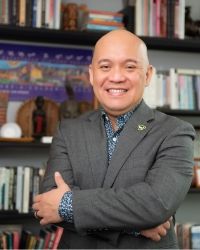Division of Teacher Education receives $1.1 million from U.S. Department of Education to recruit, train and retain STEM teachers for high-need, urban districts

The Wayne State University College of Education's Division of Teacher Education received a $1.1 million grant from the U.S. Department of Education for the Metro Detroit Teaching Residency for Urban Excellence (TRUE) Project, a collaborative initiative aimed at positively impacting student learning, addressing the critical shortage of STEM teachers, and supporting the region's workforce development."¯The project will target recent graduates and mid-career professionals with STEM expertise in the metro Detroit region, especially those in the automotive and technology industries who may be impacted by precarious work conditions and are interested in upskilling to transition as school teachers.
The Metro Detroit TRUE Project will prepare 36 diverse and highly qualified teachers over an 18-month period, during which they will earn a master's and a secondary teaching certification in mathematics or sciences. Selected individuals will complete year-long residencies in Detroit and Dearborn, Michigan's largest urban school districts. As residents, they will work closely with school-based mentor teachers and university coaches, and employ high-leverage practices for student engagement and achievement. They will receive ongoing induction support for two years as full-time teachers after completion of the program."¯
Keith Whitfield, Ph.D., provost and senior vice president for academic affairs at Wayne State University, applauds the Metro Detroit TRUE Project's innovative approach towards building pillars of sustainability in the region. "Having highly qualified science, technology, engineering and mathematics (STEM) educators in the classroom is vital to the development of our nation's and region's workforce. Through our investment in the Metro Detroit TRUE Project, coupled with other efforts at the university, it is our aim to provide students in Detroit Public Schools Community District and Dearborn Public Schools with the STEM educators and experiences that spark learners' curiosity to explore STEM-related concepts that they can apply in the classroom, community and the world of work so they can thrive in the new knowledge economy.""¯
"The Metro Detroit TRUE Project's curriculum will integrate two research-based innovations - culturally responsive STEM education and trauma-informed, socio-emotional learning - that are crucial in students' academic and personal development in urban schools and communities," said Roland Sintos Coloma, Ph.D., assistant dean and professor in the Division of Teacher Education at Wayne State and principal investigator for the TRUE project. "The project will also allow us to develop a new curriculum that will ascertain teaching competency of the state's new K-12 computer science standards."
The project's process and impact will be continually evaluated, with the project team collaborating with an advisory board of stakeholders from various education, corporate, philanthropic and professional sectors to oversee progress, results and effectiveness. Project partners include Wayne State University's College of Education Division of Teacher Education,"¯College of Liberal Arts and Sciences,"¯Office of the Provost,"¯Office of Vice President for Research, and"¯College of"¯"¯Engineering;"¯U.S. Department of Education;"¯Michigan Department of Education;"¯Wayne Regional Education Service Agency;"¯Detroit Regional Chamber;"¯Detroit Public Schools Community District;"¯Dearborn Public Schools;"¯and"¯The Engineering Society of Detroit. To learn more about the TRUE Project, visit go.wayne.edu/trueproject.
The grant number for this U.S. Department of Education project is U336S190025. The U.S. Department of Education is funding 43% of this project, totaling $1,111,126. The remaining 57%, or $1,504,736, of the project will be funded by Wayne State University. The total funding received from all sources is $2,555,403.